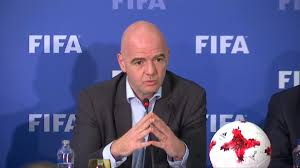FIFA president Gianni Infantino has threatened to not broadcast the Women’s World Cup in five European countries unless TV companies improve their rights offers.
Infantino said “disappointing” offers from the UK, Spain, Italy, Germany and France were a “slap in the face” of the players and “all women worldwide“.
He added it was Fifa’s “moral and legal obligation not to undersell” the event.
The World Cup, co-hosted by Australia and New Zealand, starts on 20 July.
Infantino said European broadcasters had offered world football’s governing body $1m-$10m (£800,000-£8m) for the rights, compared with $100m-$200m for the men’s World Cup.
“Should the offers continue not to be fair, we will be forced not to broadcast the Fifa Women’s World Cup into the ‘big five’ European countries,” Infantino said at a World Trade Organization meeting in Geneva.
“I call, therefore, on all players, fans, football officials, presidents, prime ministers, politicians and journalists all over the world to join us and support this call for a fair remuneration of women’s football. Women deserve it, as simple as that.”
Rights offers for previous tournaments were bundled together with other events including the men’s World Cup, but Fifa has now separated the bidding process.
In calling for improved offers, Infantino said all TV revenue for the tournament would be reinvested in women’s football and that public broadcasters have a “duty to promote and invest in women’s sport”.
Infantino added that Fifa had trebled the total prize money to $152m compared with the 2019 tournament in France and reiterated the organisation’s desire to have equal pay for the men’s and women’s World Cups by 2026 and 2027, first announced at its annual congress in March.
According to Fifa’s data, 1.12 billion people watched the 2019 Women’s World Cup in France – the most watched women’s tournament ever.
Almost half of total viewing hours were from Europe, with the average viewing time of 4.14 hours per person across the whole tournament more than double the average of the rest of the world.
That could be partly attributed to the favourable time zone and that seven of the eight quarter-finalists were European, with England reaching the semi-finals before losing to eventual winners the United States.
The World Cup starts on July 20 and ends August 20.
BBC


